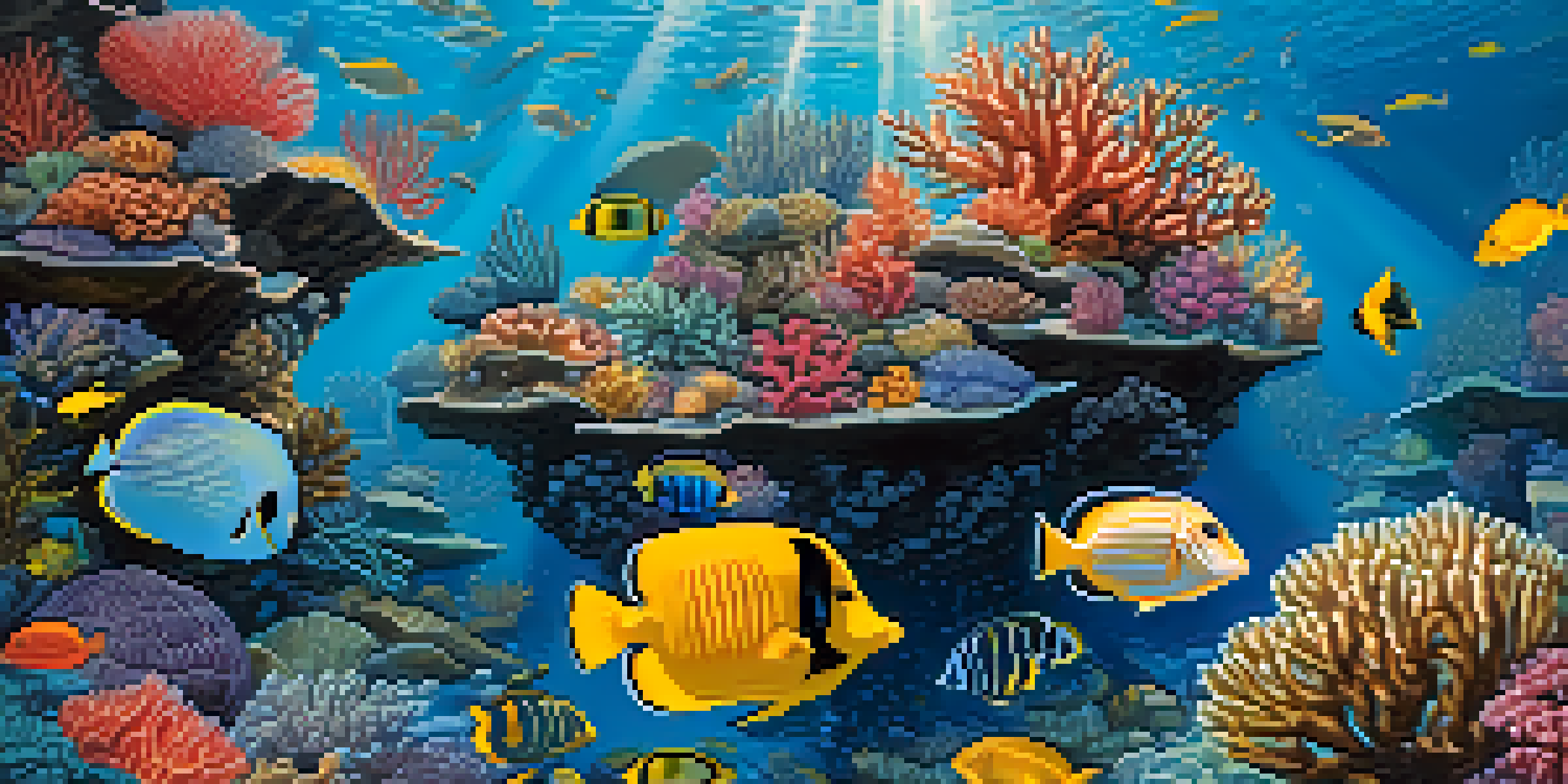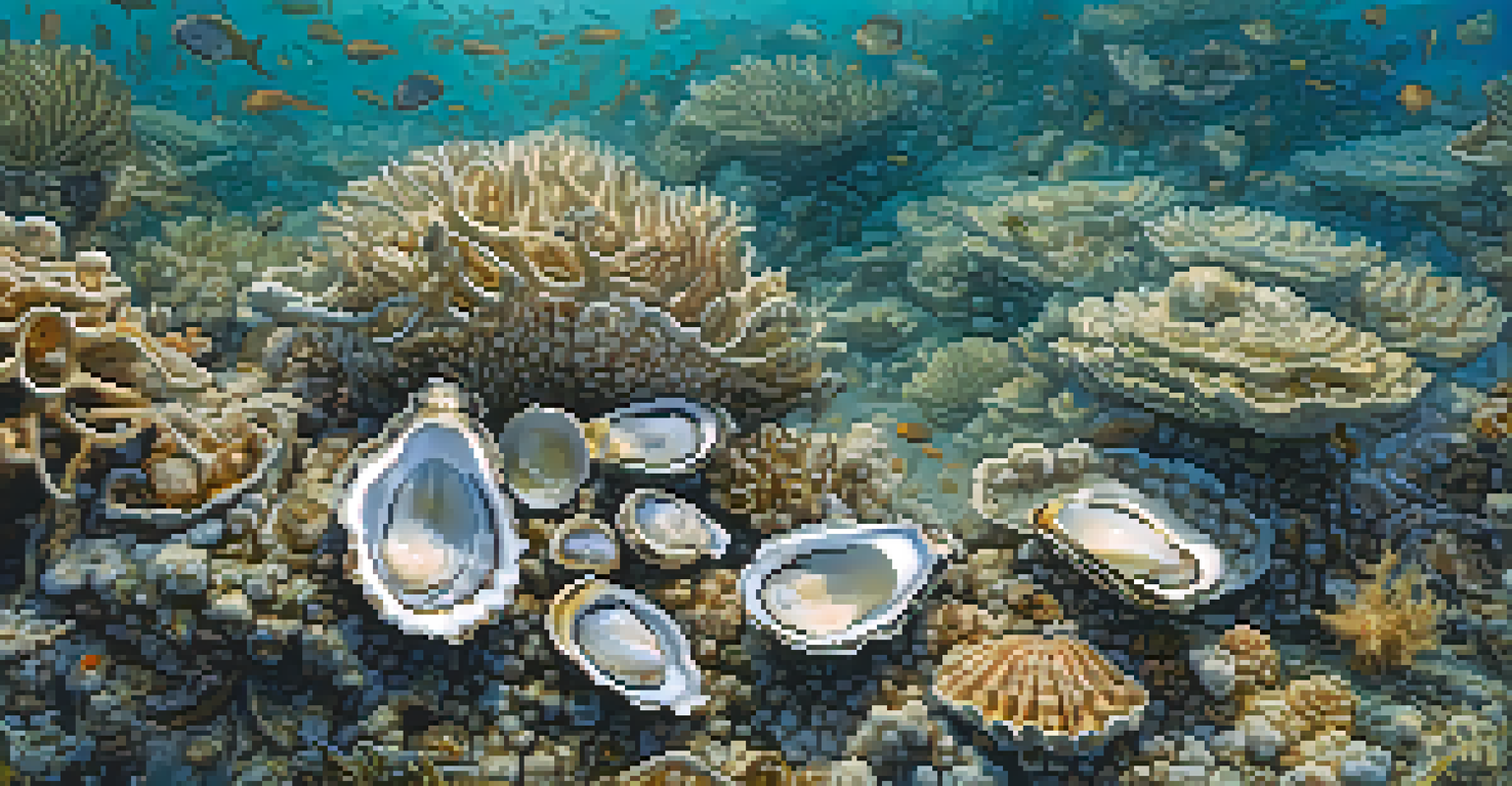Impact of Climate Change on Florida's Marine Life and Reefs

Understanding Florida's Unique Marine Ecosystems
Florida is home to some of the most diverse marine ecosystems in the world, including coral reefs, mangroves, and seagrass beds. These ecosystems play a crucial role in supporting a wide array of marine life, from vibrant fish species to endangered sea turtles. The health of these ecosystems is essential not only for biodiversity but also for local economies that depend on fishing and tourism.
The greatest threat to our planet is the belief that someone else will save it.
However, climate change poses significant threats to these delicate ecosystems. Rising sea temperatures, ocean acidification, and changing salinity levels can disrupt the balance of life in these waters. For instance, coral reefs, often dubbed the 'rainforests of the sea,' are particularly vulnerable to temperature changes, leading to coral bleaching and loss of habitat for countless marine species.
Understanding these ecosystems' importance helps highlight the urgency of addressing climate change. By recognizing how interconnected marine life is with environmental health, we can better appreciate the need for conservation efforts and sustainable practices.
The Effects of Rising Sea Temperatures
One of the most noticeable impacts of climate change is the increase in sea temperatures. Florida's coastal waters have warmed significantly over the past few decades, affecting not only the marine species that inhabit them but also the delicate balance of the ecosystems. Fish species may migrate to cooler waters, disrupting established food chains and local fishing industries.

Coral reefs are particularly sensitive to temperature changes. When water temperatures rise excessively, corals expel the algae that provide them with food, leading to a phenomenon known as coral bleaching. This not only weakens the corals but also affects the entire reef ecosystem, as many marine organisms rely on reefs for shelter and sustenance.
Climate Change Threatens Marine Life
Rising sea temperatures and ocean acidification endanger Florida's diverse marine ecosystems, affecting fish populations and coral reefs.
The long-term consequences of rising sea temperatures could be devastating, leading to a decline in biodiversity and the loss of habitats. Without immediate action to mitigate climate change, the future of Florida's marine life hangs in the balance.
Ocean Acidification and Its Consequences
As carbon dioxide levels in the atmosphere rise, the oceans absorb much of this gas, leading to ocean acidification. This process lowers the pH level of ocean water, which poses serious risks to marine life, particularly organisms that rely on calcium carbonate to build their shells and skeletons, such as corals and shellfish.
In every community, there is work to be done. In every nation, there are wounds to heal. In every heart, there is the power to do it.
Florida's coral reefs are especially vulnerable to acidification. When the pH of seawater decreases, corals struggle to maintain their structure and may even begin to dissolve. This not only threatens the corals themselves but also the myriad of species that depend on coral reefs for food and habitat.
Additionally, shellfish, such as oysters and clams, face challenges in developing their shells in more acidic waters. This can significantly impact the fishing industry and local economies that rely on these species for livelihood.
Impact on Local Fisheries and Economies
Florida's fishing industry is a vital part of its economy, providing jobs and food for millions. However, climate change is disrupting fish populations and migration patterns, which can lead to reduced catches for local fishermen. As species move to cooler waters or decline in number, the livelihoods of those who depend on fishing become increasingly uncertain.
Moreover, the changes in marine ecosystems can affect the availability of fish at different times of the year. This unpredictability poses challenges for planning and sustainability within the fishing industry, making it hard for fishermen to adapt. Local markets may also see fluctuations in prices and availability, affecting consumers.
Local Economies Depend on Fisheries
The fishing industry in Florida is at risk due to climate impacts, jeopardizing the livelihoods of local fishermen and the economy.
The economic implications extend beyond just fishermen; tourism, a major industry in Florida, also suffers when marine ecosystems degrade. Tourists flock to Florida for its beautiful beaches and vibrant marine life, and any decline in these natural attractions can have a ripple effect on the economy.
The Role of Mangroves in Coastal Protection
Mangroves play a vital role in Florida's coastal ecosystems, acting as natural barriers that protect shorelines from erosion and storm surges. They provide critical habitat for many marine species and serve as nurseries for juvenile fish. However, rising sea levels and increased storm intensity due to climate change threaten these important ecosystems.
As sea levels rise, mangroves may struggle to keep pace, leading to loss of habitat and increased vulnerability of coastal communities to flooding. Additionally, the health of mangrove forests is crucial for maintaining water quality, as they filter pollutants and provide a buffer against nutrient runoff.
Protecting and restoring mangroves can enhance resilience against climate change impacts, benefiting both marine life and human communities. By investing in these natural systems, we can help safeguard Florida's coastlines and ensure the survival of diverse marine species.
Conservation Efforts and Community Involvement
Addressing climate change and its impacts on Florida's marine life requires collaborative efforts between governments, organizations, and local communities. Conservation initiatives, such as establishing marine protected areas, can help safeguard critical habitats and promote recovery of depleted fish stocks. These areas provide refuge for marine organisms, allowing ecosystems to regenerate.
Community involvement is also crucial in conservation efforts. Local organizations and volunteers can participate in beach clean-ups, coral restoration projects, and educational programs that raise awareness about the importance of protecting marine ecosystems. Engaging communities fosters a sense of ownership and responsibility for local environments.
Community Action is Essential
Collaborative conservation efforts and community involvement are crucial for protecting Florida's marine ecosystems and combating climate change.
By working together, we can create a more sustainable future for Florida's marine life. Encouraging responsible practices and policies can help mitigate the effects of climate change and preserve the rich biodiversity that characterizes Florida's waters.
The Future of Florida's Marine Life: A Call to Action
The future of Florida's marine ecosystems hangs in the balance, with climate change presenting both challenges and opportunities for positive change. As individuals, we can make choices that contribute to environmental sustainability, such as reducing our carbon footprints and supporting local conservation efforts. Every small action counts in the fight against climate change.
Policymakers also play a critical role in shaping the future of Florida's marine life. Implementing regulations that limit carbon emissions, protect habitats, and promote sustainable fishing practices can create a more resilient marine environment. Investing in research and innovation can help us better understand climate change's impacts and develop effective solutions.

Ultimately, the health of Florida's marine ecosystems depends on collective action. By taking steps to combat climate change, we can protect the rich marine life that defines our coastlines and ensure these vibrant ecosystems continue to thrive for generations to come.